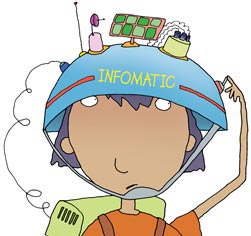Warm-Up for Reading and Writing Assessments
Warm-Up for Reading and Writing Assessments

Reading helps you learn any subject. Writing helps you share what you've learned. That's why these two skills are critical in all your classes. That's also why major assessments test your ability to read and write.
What Is Assessment?
Listen to "What Is Assessment?"
Hide audio
Assessment is another word for test. Some assessments will test your ability to read and write. The reading and writing you do every day at school and home will help you get ready for these assessments. This unit will also help.
In the following activities, you’ll learn about close reading—reading to understand the focus statement, topic sentences, details, and vocabulary of the nonfiction texts you’re assigned. You’ll also learn about on-demand writing—writing to develop your own ideas during an assessment. Strong reading skills help you write and vice versa.
In this unit, you’ll learn the reading and writing skills that you need to succeed in nonfiction assessment. If you’d like to try out these skills, see the unit “Practice Test for Reading and Writing.”
Thinking About Close Reading
To read closely, you need to think about the ideas in a text. You can do this by asking and answering questions. For starters, use the 5 W’s and H.
Read closely.
Read the following explanatory paragraph. Answer the 5 W’s and H. Make a copy of this Google doc or download a Word template.
Listen to "Do Aliens Exist?"
Hide audio
Do Aliens Exist?
By Anne Wheelock
Most scientists believe that alien life exists. It’s really simple math. Our own galaxy holds about 60 billion planets that could support life, and there are at least a hundred billion galaxies. As a result, it’s unlikely that life exists only on Earth. Don’t get too excited, though. If life exists elsewhere, it’s most likely to be single-celled, like bacteria. Even if life is more complex, it isn’t necessarily intelligent. And even if it is intelligent, it is probably too far away to travel to it in a human lifetime. So, if life does exist elsewhere, we probably won’t meet aliens anytime soon.
- Who wrote this?
Anne Wheelock
- What is it about?
Whether alien life exists and what it might be like
- Where does the topic take place?
On 60 billion planets that could support life in our galaxy
- When does it take place?
Right now
- Why is it important?
People are interested in alien life.
- How does it work?
With all the planets in the universe, it is likely that some have life. Most life forms won’t be complex or smart, though.
Teaching Tip
Questioning is the second step in the SQ3R close-reading strategy—Survey, Question, Read, Recite, and Review. Questioning a text before and after reading it helps students engage with it.
Thinking About On-Demand Writing
To write on demand, you need to think quickly, express a clear idea, and support it with details. Answering basic questions can help you support an idea.
State and support an idea.
Answer the following questions. Make a copy of this Google doc or download a Word template.
- What do you think about the existence of alien life?
(Answers will vary.)
- Why do you hold this thought?
(Answers will vary.)
- How could you convince others to agree with you?
(Answers will vary.)
Write a paragraph.
State your idea about alien life. Then support it with details.
(Answers will vary.)
Teaching Tip
Questioning can help students gather their thoughts for writing. Good explanatory writing answers the reader’s questions about the topic.